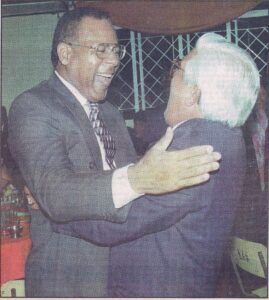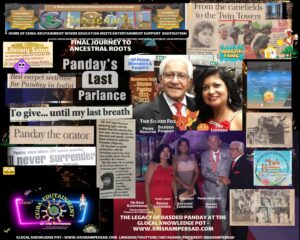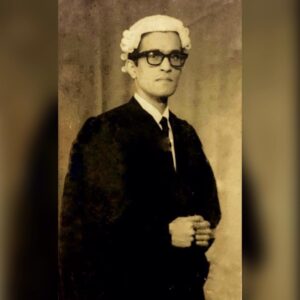|
Getting your Trinity Audio player ready...
|
Reading Time 6 mins
January 30, 2024
“The stand is like a wooden shelf after a storm….
All I can see is some broken bottles so far/
An indication the Carnival is over.”
– Kitch, “The Carnival is Over”
When the speaker was summoned to the podium at the July 2008 UWI (Mona) Conference, I, in my naiveté, half expected to hear boos and catcalls, for he was a checkered career in politics. Yet, when he rose to speak before many grassroots Jamaicans and quite a few old-time radicals, there was peaceful silence throughout his presentation. Indeed, the ex-politician panelist is more than an enigmatic figure in Jamaica.
I was struck at that moment by the brilliant presentation on facets of Jamaican culture and the seeming absence of hate in the audience. This civility and willingness to listen reverently to Edward Seaga, a ‘notorious’ ex-leader (some would gang, too), was also reflected at an October 2008 UWI (Mona) conference commemorating the 40 Anniversary of the Walter Rodney Riots. Even when Seaga, now an Honorary Fellow @ UWI, presented still holding fast—despite subsequent revelations refuting the then government’s claims–to the 1968 JLP decision to issue the ban on Walter Rodney, his upsetting views, though vigorously challenged and getting an “F” from most participants, were received with respect. Since demitting office, Seaga has been able to carve out a space within which he continues to serve Jamaican civic society.
This image of Seaga’s reception at the conferences came to mind about three weeks ago when I saw a picture in the Sunday Guardian of former Prime Ministers Basdeo Panday and Patrick Manning attending Presentation College Old Boys’ Association Day, where it was reported they had cordial conversations while engaging fellow old boys. Something about that picture forced me to recall Kitch’s lyrics, which serve as an epigraph to this commentary. And, as I reflected on the daring of Kitch and his prescience, amid the rubble and seeming desolation of Carnival’s aftermath, to do the improbable and record the scene for posterity, I, too, thought of ‘bending de angle’ on those who’d wish for the destruction of the PNM–the party which was in no small way responsible for the consolidation of party politics in T&T—and of Panday, a soldier who took many blows on the frontline battling successive PNM regimes.
This led me to ponder the sacrilegious: given their 75-plus years of collective (dis)service to the nation, is there a space within which Panday and Manning, perhaps the two most vilified leaders in our nation’s history, may still be able to contribute to the country– even if merely as spokesmen for all fours, checkers, and other card/board games?
The thought lay suppressed in the subconscious until I read reactions to Hazel Manning’s comment in this Tuesday’s (June 29) Guardian. The bloggers let her have it. Many wondered: What nerve of her to think anything she has to say may be valuable in the national conversation? As far as many were concerned, the election results should render her mute. Paraphrasing a few bloggers, Mannings and the PNM should be banished and consigned to limbo.
To be sure, I hold no brief neither for the Mannings nor for Panday as Manning, particularly, may have lost all critical sensibilities and possibly the former minister of local government also, for how could she not have seen the rank nepotism, simony, and sheer opportunism of accepting a position in the cabinet? Such was grounds for the entire plot to resign in protest, but we know the soft matter that the body was made of. Both conscience and courage were in short supply while sycophancy was in. Corrupting Stalin’s lyrics somewhat, it can be said that There were no no-men in that yes-man cabinet.
Still, thrashing these leaders, though very deserving, falls outside the purview of this explanation, which is to initiate a conversation on their future place, if any, in civic society. After all, we may be paying them hefty pensions for a long time. Why not let them do something productive for the first time? Listening to the blogs and even the views of some otherwise thoughtful people, one gets the impression that Panday and Manning, especially, were the most atrocious leaders ever (even if one included Richard Nixon, notwithstanding his refashioning.) Must we applaud the continued obsession with the excesses of Manning’s (mis)rule and perhaps cripple the nation and engulf us in a witch hunt and possibly stasis?

Trinidad’s most famous political opponents, Patrick Manning and Basdeo Panday, enjoy each other’s company.
Moreover, rather than Manning’s rule being symbolic of a dictatorial thrust, and even Panday’s stranglehold on the UNC being that of an authoritarian maximum leader, Sparrow, perhaps a bit tongue-in-cheek, may have called it best in the ‘Solomon Affair’ with his haunting line, “This place too damn democratic.” After all, didn’t both leaders allow the chips to fall where they may and did not try to recast them?
Leaders who have not been convicted of any crimes—and for sure, some would want to include the nefarious category of ‘crimes against the people’—should be able to continue to serve the nation, even in some civic capacity. As a start, UWI and UTT should consider providing office space for leaders once they demit office to engage in nonpartisan issues and–if they can write–even write their memoirs. Why not make Panday an Honorary Fellow to help train the next generation of trade unionists (especially those who like to drink)? When Manning leaves parliament, he, too, should be made an Honorary Fellow to help teach the scriptures and thus visualize Valentino’s vision: “Every day I wake in this country religion approaches me/The corrupt, the oppressed, they all preach the gospel.”
Perhaps the nation can only benefit from the experience and ‘insights’ of our former Prime Ministers. And by so doing, we may well break the cycle of leaders being perpetually cast into the wilderness—the dustbin of history–as was Tubal Uriah “Buzz” Butler, Albert Gomes, George Chambers, and we all know what happened to Eric Williams: As Selwyn Ryan notes, “bothered by the pervasive social unrest” of the early 1980s and troubled by the creeping ascendancy of the then ONR, Williams may well have viewed electoral defeat and the fear of living in a Trinidad so quick to humiliate and jeer former leaders, “as a fate worse than death.” Suppose Williams’s death can be viewed as a kind of “altruistic suicide” to save the PNM. Can Manning’s decision to call an early election be viewed as his unwittingly emulating Williams, but this time to save the nation?
Dynamics of Change
What about us makes it so difficult for our former leaders/politicians to reintegrate into civil society quickly? Does this tendency mask a national problem? Interestingly, not just our politicians are held on a pedestal one day and discarded as toxic the next. Consider: How often have we harangued a calypsonian who, after years of great calypsos, has a bad year, and presto, many are quick to jeer and write him off as a “shit-hound”? Is the treatment different for the acclaimed cricketer who hits a bad patch? Or is it as a partner, Monty Guy, says, “Trinidad and Tobago is a mamaguy country as soon as yuh ass fall yuh have to eat grass”?
 Of our past leaders, only Robinson has been able to contribute to active involvement in party politics. Was his the exception because he got his humiliation—during the ‘Muslimeen grab for power’ in July 1990–before demitting office? Or was it because he was more technocrat than a politician?
Of our past leaders, only Robinson has been able to contribute to active involvement in party politics. Was his the exception because he got his humiliation—during the ‘Muslimeen grab for power’ in July 1990–before demitting office? Or was it because he was more technocrat than a politician?
Indeed, capturing all the angst of our time and singing way beyond the boundaries of cricket, David Rudder’s lyrics continually challenge us to refashion our futures…
“Way down under a warrior falls
Michael Holding falls in the heat of the battle
‘ Michael should have left a long time.’
I heard an angry brother shout
Caribbean man, that, that,
That is the root of our trouble.”
*This is to be continued in 10 years when, because of term limits, Persad-Bissessar becomes the next Honorary Fellow of Dressmaking @ UWI or UTT.
*First Published in Everybody’s August 2021

